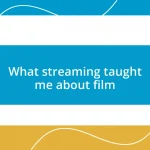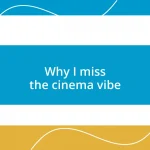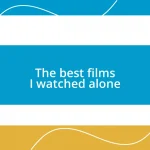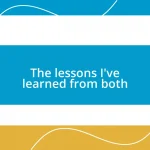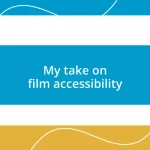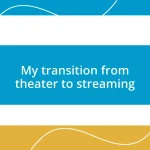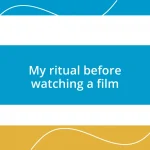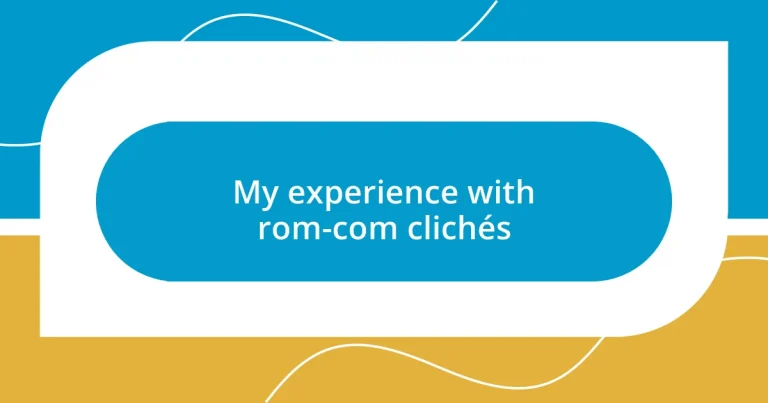Key takeaways:
- Rom-com clichés provide comfort and familiarity but can stifle creativity and originality in storytelling.
- Breaking away from clichés leads to richer narratives, deeper character arcs, and representation of diverse experiences in love.
- Unique rom-coms challenge traditional structures, exploring unconventional relationships and modern societal themes, reflecting real-life complexities.

Understanding rom-com clichés
Romantic comedy clichés often serve as shortcuts to establish familiarity with audiences. For instance, how many times have you watched a character trip over something only to fall dramatically into someone’s arms? It’s a delightful moment that sparks laughter, but it also feels like a well-worn path we’ve traveled before. I remember feeling a twinge of frustration when I spotted the same old trope—why not create a unique setup that surprises us instead?
Understanding these clichés means recognizing the balance they bring to storytelling. They can reinforce our expectations, offering a sense of comfort as we settle in for a lighthearted escape. Yet, I can’t help but wonder: how much do we miss out on by relying solely on what’s tried and true? Reflecting on my experiences, every time I see the “will they, won’t they” dynamic unfold predictably, I actually yearn for a deeper, more original narrative.
As I dive deeper into these familiar patterns, I begin to see them as mirrors reflecting our own experiences in love and life. Each cliché—be it the quirky best friend or the grand romantic gesture—tugs at something within us. I still recall hearing “you complete me” during a pivotal moment in a film. That line stuck with me, and I realized it encapsulates a fantastic feeling of connection, even if the delivery can sometimes be a bit over the top. Isn’t it curious how clichés can capture profound emotions while simultaneously veering into the absurd?

Common rom-com tropes explained
It’s fascinating how some rom-com tropes have become almost universal in our viewing experience. Take the “meet-cute,” for example, where two characters have a charmingly awkward first encounter. I recall laughing out loud when I saw a character spill coffee all over their love interest—it felt predictable, but there’s something undeniably endearing about that moment that keeps us engaged. It’s like reuniting with an old friend; we know what’s coming, but we still can’t help but smile.
Another classic trope is the “love triangle,” a situation that often adds just the right amount of tension. I once found myself rooting for both sides when watching a film where the heroine was torn between her responsible boyfriend and a free-spirited artist. I couldn’t help but reflect on my own past relationships—how sometimes choosing between two paths can feel equally thrilling and terrifying. This trope, while common, dives deep into our fears and desires around commitment and freedom.
Lastly, we can’t forget the “grand gesture” that often concludes a rom-com. These moments can be both cringe-worthy and heartwarming. I remember watching a film where the protagonist ran through the rain to declare their love at an airport—I found myself both rolling my eyes and cheering at the same time. It hits me that while these gestures may feel overplayed, they also symbolize the lengths we’re willing to go for love, stirring a deep sense of nostalgia for those bold, impulsive moments we often dream about.
| Trope | Description |
|---|---|
| Meet-Cute | A charming or awkward first encounter between love interests. |
| Love Triangle | A conflict where one character must choose between two potential partners. |
| Grand Gesture | A dramatic action taken to prove love at a pivotal moment. |

Impact of clichés on storytelling
There’s a strange dichotomy that I find intriguing when it comes to clichés in storytelling. On one hand, they offer a comforting predictability that allows viewers to settle into a narrative with ease. I often recall snuggling up on the couch, popcorn in hand, feeling an overwhelming sense of nostalgia when a familiar plot twist unfolds. Yet, there’s also an undercurrent of disappointment, like the feeling of déjà vu when a film treads the same narrative path. It makes me think about how these clichés can sometimes create a barrier to true creativity, leading us to miss out on potentially groundbreaking stories.
- Clichés can evoke strong emotional responses, reminding us of past experiences.
- They create a sense of familiarity which some audiences may crave.
- Overreliance on clichés might stifle originality, leading to predictable plots.
- The challenge lies in balancing these well-worn elements with fresh storytelling.
I can’t ignore the subtle impact clichés have on character development either. While a quirky best friend might add charm, they can easily slip into the realm of stereotype. I had an experience watching a rom-com where I felt the secondary characters were little more than caricatures—funny yet forgettable. It made me reflect on how these simplified roles can dilute the richness of a story, potentially keeping audiences at arm’s length from truly connecting with the characters involved. I think about how much more powerful a unique character could have been, bringing a fresh layer of depth and insight into the narrative.

Personal experiences with clichés
Reflecting on my experiences with rom-com clichés, I can’t help but chuckle at how often I’ve seen the “best friend who secretly harbors feelings” trope. It reminds me of a time at a friend’s wedding when I felt a jolt of recognition as the best man gave a heartfelt speech, only to hint at his unrequited love for the bride. I’d be lying if I said it didn’t bring me a mix of cringeworthy nostalgia, but it also sparked a realization about the complexities of friendship and love that often go unaddressed. Isn’t it wild how true life mirrors these clichés, blending laughter and heartache in a way that feels almost scripted?
Then there’s the infamous “horrible first date” that turns out to be a catalyst for romance. I recall when I went on a blind date that started with a major mishap—my date spilled an entire drink on me! Instead of fleeing the scene, however, we both erupted in laughter, and it set the tone for an evening filled with unexpected joy and connection. It made me wonder, how often do we dismiss a potentially great connection over a small misstep? Those moments make me think that sometimes the most delightful experiences can sprout from the most predictable setups.
Clichés also seem to influence our expectations around love and relationships. I remember watching a rom-com where the leading lady was serenaded under her window—a scene that felt so straight out of a fairy tale. While it was delightful, it also left me pondering: does real love always require such grand gestures? In my own romantic life, I’ve treasured the quieter moments—like snuggling with a partner on the couch, sharing pizza and laughter. I can’t help but think that maybe our lives, with all their imperfections, are just as romantic as those scripted high-drama scenes.

Breaking the clichés in films
As I consider how filmmakers might break away from clichés, it strikes me that fresh storytelling is all about risky choices. I remember watching a film that dared to flip the script on the classic “love at first sight” trope. Instead, the characters embarked on a slow-burn friendship, filled with awkwardness and genuine moments of connection. This approach not only felt more authentic but also allowed their eventual romance to blossom in a way that felt earned and real. Isn’t it fascinating how subverting expectations can lead to deeper emotional engagement?
What’s even more intriguing is how breaking clichés can pave the way for richer character arcs. In one indie rom-com I saw, the protagonist wasn’t your typical “flawless hero”; she was flawed, relatable, and navigating the chaotic aftermath of a failed relationship. It felt like watching a friend on screen, struggling yet resilient. This made me wonder: why do we often settle for glossy, perfect characters when the messiness of real life can be so much more compelling?
Another aspect worth exploring is how modern narratives are embracing diverse voices and storylines that go beyond traditional rom-com structures. I recall feeling genuinely moved by a film that showcased a same-sex couple navigating societal expectations and personal growth simultaneously. It opened my eyes to the importance of representation in storytelling. How can we celebrate love in all its forms if we cling to dated narratives? Breaking away from clichés not only enriches the viewing experience but also reflects the vibrant tapestry of our reality.

Fresh takes on romantic comedies
When I think about fresh takes on romantic comedies, I can’t help but recall a film where the couple didn’t even end up together. Instead, they learned important lessons about themselves and their individual paths. I remember sitting in the theater, feeling a mix of surprise and satisfaction. It made me question: does every romantic story need a fairy-tale ending? In that moment, I realized that sometimes, the most profound connections come from the journeys we take, regardless of whether they lead to romance.
Another captivating twist I’ve encountered is when the characters are placed in unusual settings—like a rom-com set in a bustling co-working space. The witty banter and playful interactions that unfolded there felt so relatable. I remember chuckling at the instances where the characters had to navigate both personal and professional boundaries, making me reflect on my own office dynamics. Wouldn’t it be great if more films embraced the messiness of our everyday lives? It’s in those quirky settings that genuine romance can flourish in unexpected ways.
Moreover, I find it intriguing how some filmmakers are now incorporating elements of social commentary into their romantic narratives. Watching a film where the couple tackled social issues together truly resonated with me. It felt empowering, reminding me of how real relationships often thrive on shared passions and values. Isn’t it refreshing to see love portrayed not just as an escape, but as a catalyst for change? I believe that weaving deeper themes into rom-coms can help redefine love in a way that reflects our ever-evolving world.

Recommendations for unique rom-coms
When I recommend unique rom-coms, I often suggest films that challenge conventional narratives. One such gem that caught my eye featured a pair of rivals who slowly transitioned into partners while competing in a cooking contest. I remember laughing at their playful jabs and wondering how competition can morph into attraction. It seemed to beautifully illustrate that love can arise from unexpected places, doesn’t it?
Another film that stands out to me is one that delves deep into the concept of friendship. The protagonists started as best friends before realizing their romantic feelings for each other, but the twist was that they both had ongoing relationships with other people throughout most of the film. I found myself empathizing with their struggles of balancing love and loyalty, and it reminded me of how sometimes life is not about choosing one over the other but finding a way to blend both. Isn’t it refreshing to see such complexities portrayed on screen?
Lastly, I can’t help but mention a unique indie film where the storyline revolved around a couple who met through a virtual reality game. I found it incredibly relevant given today’s technology-driven world. As I watched them navigate both the digital and real-world connections, it struck me how love can transcend physical boundaries. It made me ponder: how do we define reality in relationships today? This film invited me to reflect on my own experiences with love in our ever-evolving digital landscape.

